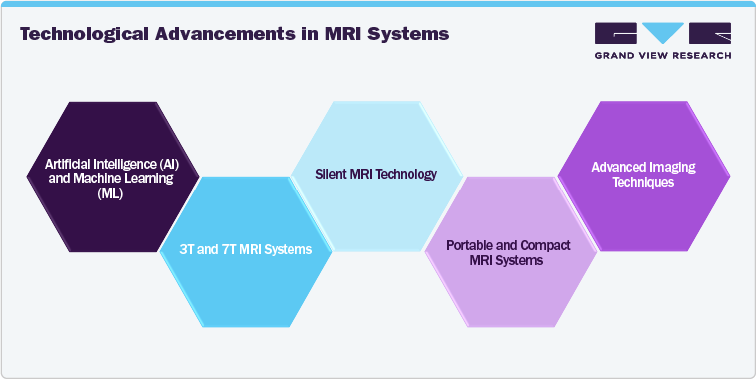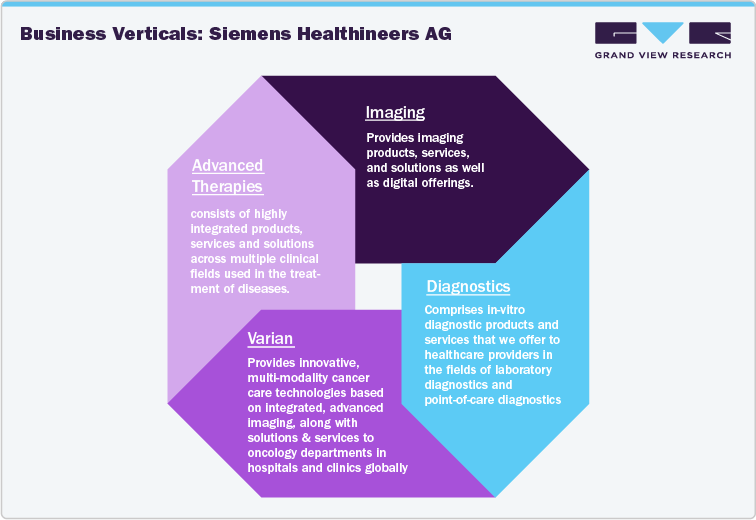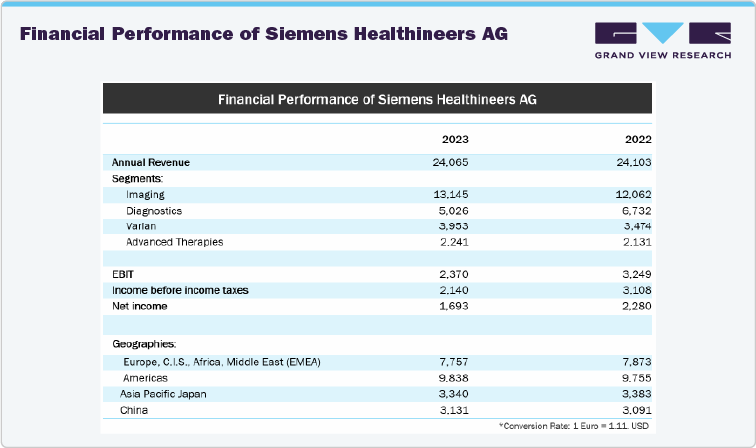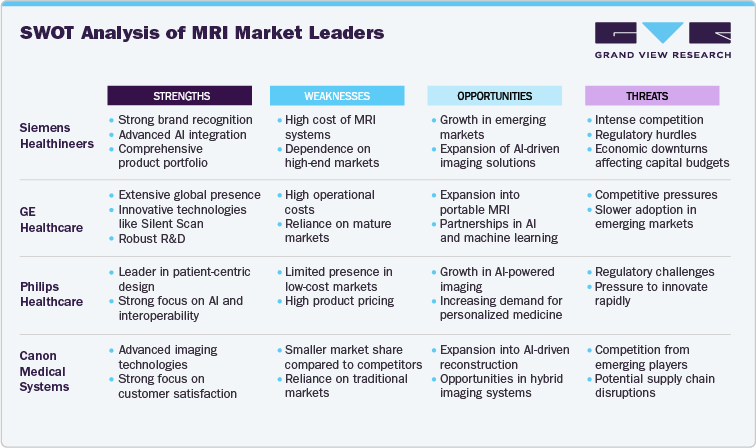- Home
- »
- Market Trend Reports
- »
-
MRI Systems Market: Competitive Landscape Overview And Future Outlook
![MRI Systems Market: Competitive Landscape Overview And Future OutlookReport]()
MRI Systems Market: Competitive Landscape Overview And Future Outlook
- Published: Sep, 2024
- Report ID: GVR-MT-100247
- Format: PDF, Horizon Databook
- No. of Pages/Datapoints: 70
- Report Coverage: 2024 - 2030
Overview Of The Magnetic Resonance Imaging Industry
The Magnetic Resonance Imaging (MRI) industry is a pivotal segment of the global medical imaging market, renowned for its non-invasive diagnostic capabilities. Globally, the MRI market is driven by the rising prevalence of chronic diseases, advancements in imaging technology, and increasing demand for early and accurate diagnosis. The industry is characterized by a diverse range of MRI systems, from high-field and ultra-high-field MRI to open and portable systems, catering to varied clinical needs.
Notable Innovations Shaping MRI Industry
Technological innovation is a key driver of competition in the MRI systems market. Companies are investing heavily in R&D to enhance image quality, reduce scan times, and improve patient comfort.

Some of the most notable advancements include:
Artificial Intelligence (AI) and Machine Learning (ML): AI and ML are being integrated into MRI systems to automate image analysis, reduce artifacts, and improve diagnostic accuracy. AI-driven software can assist radiologists in detecting anomalies more quickly and accurately, thereby enhancing workflow efficiency.
-
Siemens Healthineers and GE Healthcare have been at the forefront of integrating AI and machine learning into their MRI systems, offering enhanced image reconstruction and diagnostic accuracy. Siemens’ AI-Rad Companion and GE’s AIR Recon DL are prime examples of how AI is improving workflow efficiency and diagnostic precision.
-
Emerging players like Hyperfine are also leveraging AI in their portable MRI systems, making advanced imaging accessible in previously underserved settings. The integration of AI into MRI technology is not only improving image quality but also enabling real-time decision-making during diagnostic procedures.
3T and 7T MRI Systems: The demand for higher field strength MRI systems, such as 3T and 7T machines, is increasing due to their superior image resolution and ability to detect smaller lesions. These systems are particularly useful in neurological and musculoskeletal imaging, where high precision is required.
-
Companies like Siemens Healthineers and United Imaging Healthcare are leading the development of ultra-high-field MRI systems, particularly 7T MRI, which offers superior image resolution and is particularly valuable in neurological research and complex diagnostic cases. The adoption of 7T MRI is still limited but is expected to grow as more clinical applications emerge and as regulatory approvals are obtained in more regions.
Silent MRI Technology: Patient comfort is a growing concern, and manufacturers are developing MRI systems with reduced noise levels. Silent MRI technology minimizes the noise produced during scans, making the experience less stressful for patients, particularly those with claustrophobia or anxiety.
- GE Healthcare has pioneered the development of Silent MRI technology, significantly reducing the noise levels associated with traditional MRI scans. This innovation is particularly beneficial for improving patient comfort, especially among pediatric and geriatric patients, and is becoming a key differentiator in a market where patient experience is increasingly important.
Portable and Compact MRI Systems: The development of portable MRI systems is another significant trend. These systems are designed for use in emergency rooms, intensive care units, and remote locations, where traditional MRI machines may not be feasible. Portable MRI systems offer the flexibility of point-of-care imaging, which is crucial for time-sensitive diagnoses.
- The development of portable MRI systems represents one of the most significant innovations in recent years. Hyperfine’s Swoop has disrupted the traditional MRI market by providing a compact, low-cost solution that can be deployed in various healthcare settings, including remote locations. This has opened up new market segments and provided a competitive edge to companies focusing on portability and accessibility.
Advanced Imaging Techniques: Techniques such as functional MRI (fMRI), diffusion tensor imaging (DTI), and magnetic resonance spectroscopy (MRS) are being increasingly utilized to provide more detailed information about brain activity, tissue composition, and metabolic changes, respectively.
Hybrid Imaging Systems: The trend toward hybrid imaging, combining MRI with other modalities like PET, is gaining momentum. Philips Healthcare and Canon Medical Systems are exploring hybrid systems that offer comprehensive diagnostic capabilities by merging structural and functional imaging. This not only enhances diagnostic accuracy but also broadens the scope of applications, making these systems attractive in oncology and neurological imaging.
Competitive Scenario of the MRI Industry
The Magnetic Resonance Imaging (MRI) industry is highly competitive, with a few major players dominating the market, while a number of emerging companies are rapidly gaining ground through innovation. The established leaders, Siemens Healthineers, GE Healthcare, Philips Healthcare, and Canon Medical Systems continue to maintain a strong market presence through extensive R&D investments, strategic partnerships, and a broad portfolio of advanced MRI systems. However, the competitive landscape is becoming increasingly dynamic as new players introduce disruptive technologies.
The competitive scenario in the MRI industry is characterized by the rapid pace of innovation, with companies vying to develop the next breakthrough technology that will set them apart. The ongoing advancements in AI, portability, ultra-high-field imaging, and patient-centric designs are reshaping the market and challenging established players to continuously innovate. As a result, the MRI industry is likely to see continued evolution, with new entrants disrupting traditional market dynamics and established companies striving to maintain their competitive edge through technological leadership and strategic market expansion.
The report analyses the competitive landscape in this industry based on parameters mentioned below:
Competitive Landscape: Top 10 MRI Manufacturers Overview
Market Outlook
Company Categorization
Company Share Analysis (Top 10 companies)
Company Position Analysis
List of Key Companies by Region
Company Overview
Product Benchmarking
Financial Performance
Recent Strategic Initiatives
SWOT Analysis
Emerging Players: Overview of 60+ Emerging Players and Startups in the MRI Industry
Company Overview
Establishment Year
Headquarters
Business Verticals
Employee Count
Investor Information
Total Funding (USD)
Product Benchmarking
Strategic Initiatives
SWOT Analysis
Company Profiles:
Siemens Healthineers AG
Establishment Year: 1st October 1847
Headquarters: Erlangen, Germany
Number of Employees: 71,000 (as of September 2023)
Parent Organization: Siemens
Siemens Healthineers AG is a leading global player in the medical imaging industry, particularly recognized for its innovations in Magnetic Resonance Imaging (MRI). As a division of Siemens AG, the company leverages its engineering expertise and extensive R&D capabilities to offer a comprehensive range of advanced MRI systems, including 1.5T, 3T, and the ultra-high-field 7T systems. Siemens Healthineers is at the forefront of integrating Artificial Intelligence (AI) into MRI technology, enhancing diagnostic accuracy, reducing scan times, and improving patient outcomes. With a strong global presence and a commitment to continuous innovation, Siemens Healthineers remains a dominant force in the MRI market, driving advancements that shape the future of medical imaging.

Product Portfolio of Siemens Healthineers AG
Product Name
Category
Description
MAGNETOM Free.Max
High-V MRI
Combines 0.55T field strength with digitalization for high diagnostic quality and new clinical possibilities.
MAGNETOM Free.Star
High-V MRI
Offers reliable imaging quality at a lower field strength, ideal for specific clinical applications.
MAGNETOM Sola
1.5T MRI Scanners
Advanced 1.5T scanner with BioMatrix technology for consistent, personalized imaging across diverse patients.
MAGNETOM Altea
1.5T MRI Scanners
Designed for efficiency and patient comfort, with a 70 cm Open Bore and lightweight coil technology.
MAGNETOM Amira
1.5T MRI Scanners
Proven 1.5T system with Tim technology for reliable performance in clinical routine imaging.
MAGNETOM Sempra/Sempra-Elite
1.5T MRI Scanners
Offers essential 1.5T imaging capabilities in a cost-effective and compact design.
MAGNETOM Vida
3T MRI Scanners
High-performance 3T scanner with BioMatrix technology, optimized for complex diagnostic procedures.
MAGNETOM Lumina
3T MRI Scanners
Flexible and powerful 3T MRI system with Tim 4G technology for fast and reliable imaging.
MAGNETOM Prisma
3T MRI Scanners
Ultra-high performance 3T MRI system designed for advanced research and clinical applications.
MAGNETOM Terra
7T MRI Scanners
The world’s first clinical 7T MRI scanner, offering ultra-high-field imaging for specialized research needs.
Biograph mMR
MR-PET Scanner/Molecular MRI
Integrates state-of-the-art 3T MRI with PET, offering simultaneous molecular and anatomical imaging.
MAGNETOM Lumina
Open Bore MRI Scanners
70 cm Open Bore scanner that enhances patient comfort with high-resolution imaging capabilities.
MAGNETOM Altea
Open Bore MRI Scanners
Also listed under 1.5T MRI, featuring a 70 cm Open Bore design, ideal for diverse clinical challenges.
MAGNETOM Sola
Open Bore MRI Scanners
Open Bore scanner designed for high patient comfort and operational efficiency.
MAGNETOM Vida
Open Bore MRI Scanners
A pioneer in Open Bore design with a wide 70 cm bore and short tunnel, offering advanced imaging for all patients.

Strategic Initiatives
Companies drive growth through a blend of strategies, including significant investments in innovation and research to develop new products and technologies. They expand their market presence by entering new regions and targeting diverse customer segments, while strategic partnerships and acquisitions enhance their capabilities and competitive edge. Additionally, a strong focus on customer-centric approaches ensures exceptional experiences, fostering loyalty and driving long-term success.
Recent developments by Siemens Healthineers AG:
-
In February 2024, Siemens Healthineers has unveiled Magnetom Flow, a 1.5 tesla MRI platform with virtually helium-free technology, reducing helium use from 1,500 liters to 0.7 liters through Dry Cool technology. Presented at the European Congress of Radiology 2024, the system improves efficiency, sustainability, and patient experience with AI-enhanced imaging and high automation. Andreas Schneck emphasized its benefits in managing healthcare costs and personnel shortages, while Dr. Markus Kopp praised its ease of use and quicker scan times.
-
In September 2023, Siemens Healthineers experts Dr. Stephan Biber and Dr. David Grodzki, along with Prof. Michael Uder from Uniklinikum Erlangen, have been nominated for the German Future Prize for their development of the Magnetom Free MRI platform. This innovative system features a low-field strength of 0.55 Tesla, AI-based image reconstruction, and significantly reduced helium requirements, making MRI more accessible and cost-effective. The platform's compact design, ease of installation, and simplified operation address traditional MRI limitations, opening new possibilities for global diagnostics. The award will be presented by the Federal President on November 22.
-
In February 2023, Siemens Healthineers and Unilabs have announced a strategic partnership valued at over USD 200 million to enhance diagnostic testing infrastructure. Unilabs will acquire over 400 laboratory analyzers, including high- and mid-volume immunoassay and clinical chemistry analyzers from Siemens Healthineers, to modernize its network and improve patient care. Sharon Bracken, Head of Diagnostics at Siemens Healthineers, highlighted the collaboration's potential to advance laboratory operations and data analytics. Both companies are also committed to reducing their environmental footprint through sustainable practices.
-
In November 2022, Siemens Healthineers has introduced Magnetom Viato.Mobile, a new 1.5 Tesla MRI scanner designed for mobile use. Housed in a trailer, it offers flexibility for both short- and long-term deployments, including screening programs in underserved areas. The system features remote operation capabilities via internet or 4G, allowing for remote expert support and streamlined maintenance. Kim Tzoumakas, CEO of RAYUS Radiology, highlighted the scanner’s ability to provide high-quality imaging with greater flexibility, benefiting healthcare providers and patients nationwide.
-
In July 2022, Siemens Healthineers has introduced Mobilett Impact, a new mobile X-ray system unveiled at the European Congress of Radiology 2022. Designed for bedside imaging, the system integrates fully with hospital systems and transmits data wirelessly, streamlining the workflow with minimal training required. Verena Schön, Head of X-ray Products, emphasized its efficiency in high-demand settings like ICUs, where continuous monitoring is critical. Mobilett Impact is optimized for high-quality imaging with low radiation doses, addressing challenges such as staff turnover and cost pressures.

Emerging Players in MRI Technology
While established giants like Siemens Healthineers, GE Healthcare, Philips Healthcare, and Canon Medical Systems dominate the MRI market, a new wave of emerging players is bringing innovative solutions to the forefront. These companies are leveraging cutting-edge technologies such as AI, machine learning, and portable imaging to carve out a niche in the competitive landscape.
-
Hyperfine Research, Inc.: Known for its development of the world’s first portable MRI system, Swoop, Hyperfine is revolutionizing point-of-care imaging. The Swoop system is a compact, low-field MRI device designed for use in intensive care units, emergency departments, and other settings where traditional MRI machines are impractical. This innovation makes MRI more accessible, especially in remote or underserved areas.
-
Aspect Imaging: Aspect Imaging focuses on compact, high-performance MRI systems, particularly for preclinical and research applications. Their Embrace Neonatal MRI system, specifically designed for imaging newborns, is one of their notable innovations. The system’s small footprint and specialized design allow it to be placed within neonatal intensive care units (NICUs), providing immediate and critical imaging for newborns without the need to transfer them to radiology departments.
-
Synaptive Medical: Synaptive is known for its advanced imaging and neurosurgical solutions. Their Evry MRI system is a compact, high-performance MRI designed for neurological imaging. The company’s focus is on integrating MRI with surgical navigation systems, providing real-time imaging during brain surgery to improve outcomes.
-
United Imaging Healthcare: A rapidly growing player from China, United Imaging Healthcare offers a full range of MRI systems, including high-field and ultra-high-field systems. Their focus on innovation and competitive pricing is helping them gain traction in both domestic and international markets. Their uMR Omega, a 75-cm wide bore 3T MRI system, is designed to offer a more comfortable patient experience while maintaining high image quality.
The "MRI Systems Market: Competitive Landscape Overview and Future Outlook" trend report provides a comprehensive analysis of the competitive dynamics within the global MRI systems market, offering insights from 2018 to 2030. This detailed report evaluates the key players, emerging trends, and technological innovations shaping the MRI market. It also delves into market segmentation by product type, including 1.5T, 3T, and 7T MRI systems, as well as by application across various clinical and research domains.
The report further examines the market’s geographical distribution, analyzing regional competitive landscapes in North America, Europe, Asia-Pacific, and other key regions. Additionally, the report features expert analysis on the evolving market strategies, partnerships, and mergers & acquisitions that are influencing the competitive environment. An executive summary provides a snapshot of the market’s current status and future outlook, highlighting the factors driving growth, such as advancements in imaging technology, increasing demand for early diagnosis, and the rising prevalence of chronic diseases. This report serves as a crucial resource for stakeholders seeking to understand the competitive forces and future opportunities in the MRI systems market.
Attributes
Details
Report Coverage
Competitive Analysis of 10+ key MRI Manufacturers; 60+ Emerging Players and Startups
Report Study Period
2018 to 2030
Report Representation
PDF
Contents of Report
Market Overview
Company Categorization
- Market Leaders
- Emerging Players
Company Market Share Analysis (Top 10 Players)
Company Market Position Analysis
List of Key Players, by Region
List of Emerging Players/Startups (60+ Players)
Company Profiles (Any 15)
Company Overview
- Headquarters
- Establishment Year
- Employee Strength
- Company Type/Ownership Information
- Business Verticals
Product Benchmarking
- Financial Performance (Only for Public Companies)
- Revenue
- Operating Income/Loss
- EBIT/EBITA
- Net Income/Loss
Strategic Initiatives
SWOT Analysis
Share this report with your colleague or friend.
GET A FREE SAMPLE
This FREE sample includes market data points, ranging from trend analyses to market estimates & forecasts. See for yourself.
![gvr icn]()
NEED A CUSTOM REPORT?
We can customize every report - free of charge - including purchasing stand-alone sections or country-level reports, as well as offer affordable discounts for start-ups & universities.
Contact us now to get our best pricing.
![esomar icon]()
ESOMAR certified & member
![ISO]()
ISO Certified
We are GDPR and CCPA compliant! Your transaction & personal information is safe and secure. For more details, please read our privacy policy.
We are committed towards customer satisfaction, and quality service.
Client Testimonials

"The quality of research they have done for us has been excellent..."
ISO Certified


